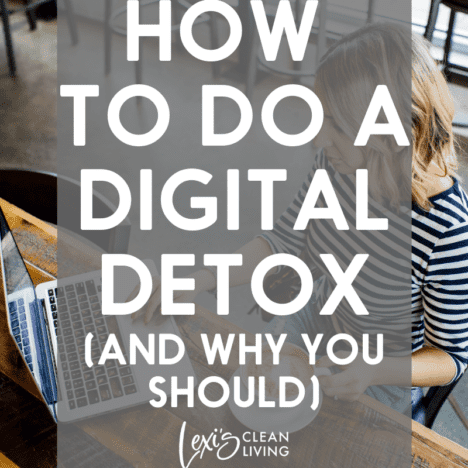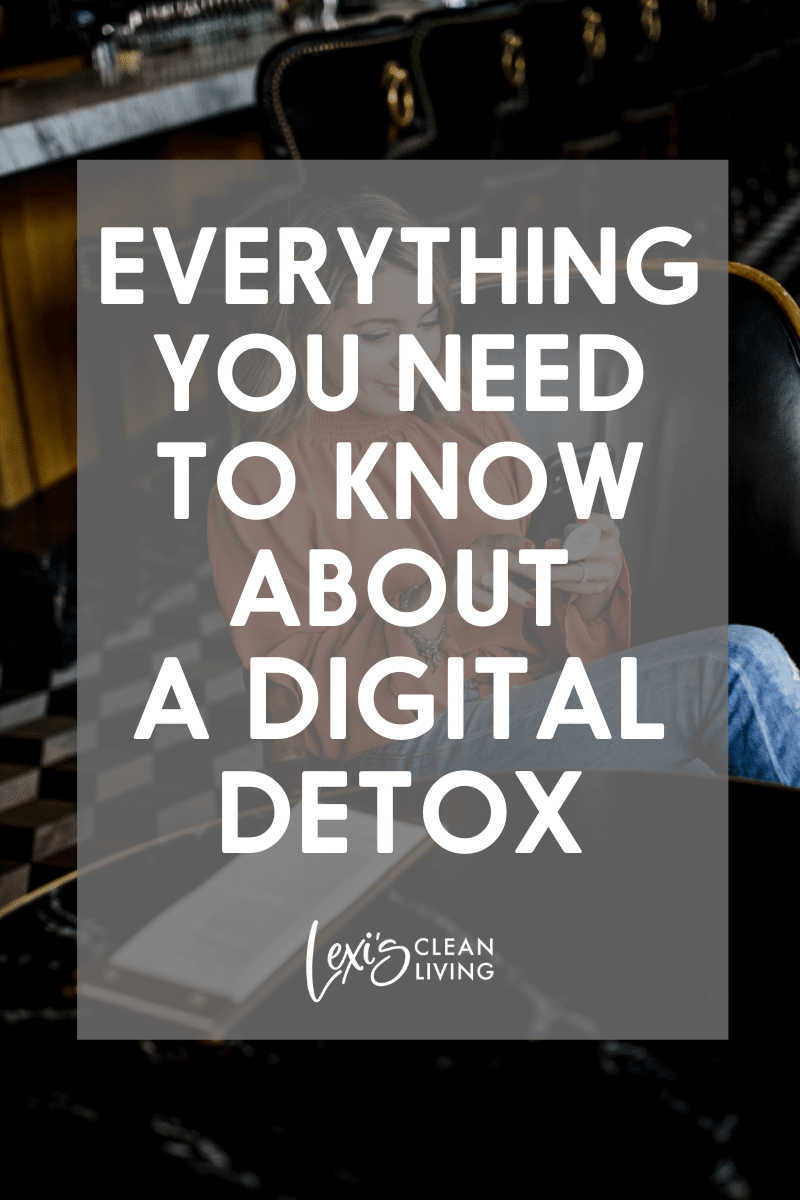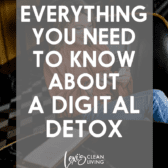This post may contain affiliate links. Please read my disclosure policy.
A digital detox can help you minimize your addiction to devices and improve the quality of your life in the process and we’re talking everything you need to know about them, and why you should do it! It’s not a one-size-fits-all plan, so we’re discussing the different ways to detox digitally and still achieve all of the benefits!
 Everything You Need to Know about a Digital Detox
Everything You Need to Know about a Digital Detox
It’s a lot of fun getting to chat with all of you about the things I’ve shared on the site — and social media! — that have really made a difference in your lives. After all, that’s why I do what I do! I’ve heard time and time again that the post I wrote about getting more intentional with my screen time before bed has inspired others to give a screen-free nighttime routine a try.
Eliminating mindless scrolling from my bedtime regimen has been helping me get better sleep for more than a year now, and it’s helped me break a phone addiction I barely knew I had!
Now that my little babe Skylar has made sleep a little harder to come by, I’m glad to have this trick up my sleeve. When you’re trying to catch shuteye with a newborn around, you need all the help you can get. Plus, as much as I love filling my camera roll with her photos, I also want to be present with her!
Digital Addiction is Real!
Let’s get real: phone addiction is so real — and while cutting back on phone time before bed is a big step, it’s not necessarily enough to curb our phone obsessions. In fact, a more sweeping digital detox might be in order. A digital detox can help you minimize your addiction to devices and improve the quality of your life in the process.
According to Forbes, a digital detox is a period of time during which a person refrains from using electronic devices such as smartphones or computers, and is regarded as an opportunity to reduce stress or focus on social interaction in the physical world.
Before you panic and stop reading, Let’s get something very clear: you don’t have to totally refrain from using your devices in order to successfully complete a digital detox. That’s one way to go about doing it, but there are plenty of less extreme versions that can still benefit you.
Whether we like it or not, we now rely on our phones, computers, and tablets for everything from basic work functions to keeping up with our personal schedules to educating our kiddos. As a result, it’s not necessarily practical to refrain entirely from our devices. That doesn’t mean it’s not worthwhile to find a happier medium with screens.
What’s the point of a digital detox?
A digital detox will likely look a little different for everyone, but the benefits are generally the same across the board. And in a world where it’s almost impossible to spend more than a few minutes without scrolling through our phones — you know it’s true! — those benefits are absolutely worth talking about.
Here are some stats from SlickText about our reliance on phones that are really going to blow your mind…
- 36% of millennials say they spend two or more hours per day looking at their phones for personal activities
- Adults spend an average of 45 minutes a day on social media alone
- 66% of the population shows signs of nomophobia, the fear of being without a phone
- The average time spent on smartphones a day is 2 hours and 51 minutes
- 50% of people feel uneasy when they leave their phones at home
- 69% of smartphone users check their phone within an hour of going to sleep or waking up
- 20% of respondents in one survey said they would rather go without shoes for a week than be without their phones
See? I told you they would blow your mind!
I’m not here to shame you for being one of the many, many people who has a phone obsession. Clearly, you’re not alone! What I am here to do is share the facts and offer some helpful suggestions so we can all get a grip on the way we use our devices — because our addictions have some major consequences.
Why a Phone Addiction is Harmful
Here are some of the problems associated with cell phone obsession, per PsychGuides.com…
- Eye pain: When you spend a lot of time staring at a screen, your eyes are bound to feel the effects. You might experience burning or itching in your eyes, as well as blurred vision, eye fatigue, and headaches.
- Neck problems: Depending on your posture, you may develop an achy neck from looking down at your device for hours on end.
- Sleep disturbance: You already know what a difference it made to my sleep to pull back on my phone use. Cell phone addiction has been connected to an increase in sleep disorders and fatigue, because the bright light from your screen can negatively impact sleep quality and stimulate your brain at a time when you’re supposed to be winding down.
- Depression and anxiety: Studies show a link between excessive phone use and mental health issues. Spending a lot of time on social media, in particular, can take a toll on your mental health. No one wants to spend too much time comparing themselves to the seemingly perfect influencers they see on Instagram.
- Relationship problems: If you’ve ever found yourself in a tense conversation with a partner, colleague, friend, child, or other loved one who can’t pay attention to you because they’re so attached to their phone — or they’re accusing you of the same — this will hardly seem like a stretch. Our devices really can take a toll on our relationships!
A digital detox can help take the edge off of your addiction and will hopefully lessen all of these effects.
So how do I actually start a digital detox?
There are many ways to detox your digital activity, and you can pick and choose the options that will work best for you. Here are some examples of digital detox that have been proven successful and beneficial:
- Cut back on screen time at night. I’m proof that this actually works! You can read all the details about how I changed this part of my routine here, but here’s the gist: you need to set boundaries with your phone in the evening. Get in the habit of leaving your phone in another room when you get in bed. (If you’re resistant to doing this because you use your phone as your alarm, consider buying a cheap old school alarm clock!) Adjust the settings in your phone so that you don’t have access to certain apps (hi, social media!) after a certain hour. You’ll find yourself less likely to get sucked into something work-related when you’re supposed to be going to bed, and you’ll have an easier time falling asleep because you won’t feel overstimulated by the images and videos on your phone screen. You can take that time to read, relax, and spend QT with loved ones, instead!
- Try a social media-free day or weekend. Given the fact that we do need our phones for work and practical matters — making calls, getting directions to where we need to go, checking our bank accounts, etc. — it’s probably not realistic to try for a phone-free day or weekend. Instead, commit to trying one or two days a week without social media, game apps, or other unnecessary functions. Delete those apps from your phone or hide them in a designated folder on your home screen so you won’t be tempted to open them until the time period you’ve decided on is over. Start small! If you like how it feels to be social media-free for one day, you might think about stretching it to a weekend, or even a week!
- Use the buddy system. Most things are easier when you have a friend to help hold you accountable. There must be someone in your family or social circle who is also interested in cutting back on their screen time! Invite them to join you on a digital detox. Commit to following the same rules — whether that’s no screen time at night, social media-free days, or something else! — and promise to check in with each other when you’re feeling tempted to break them.
- Turn your phone to grayscale. You might find that you’re less interested in scrolling through your phone if it’s not as pretty to look at! Adjust the settings on your phone so the screen is less bright or in grayscale for the hours when you don’t want to be attached to your devices. Messing around on your phone might just feel less appealing!
- Be strategic about where your apps live. Remember: you are in charge of how things appear on your phone. If you’re sick of finding yourself defaulting to social media apps all the time, think about how your device usage might be different if those apps were reorganized on your screen. Move the apps you don’t need to a designated folder or another screen on a permanent basis and consider if you actually miss them. Out of sight, out of mind!
- Designate phone-free spaces. Just because we need phones for pretty much everything we do these days doesn’t mean they need to be welcome in every part of our homes. Pick certain areas of your house or apartment where devices are allowed and others where they aren’t. Establishing these kinds of rules will force you and your loved ones to be more intentional about when you’re using your phone. Is it really worth moving to another room just to browse aimlessly on Facebook?
- Make a list of the other activities you can do with the time you usually spend on your phone. If you’re struggling to stay motivated in your digital detox, maybe you just need a reminder of other things you could be doing with that time! Take some time to write down (on paper — not your phone!) ideas for those alternative activities so you can refer back to them when you’re detoxing and feeling bored. Consider reading, going for a walk, playing a game with your family, trying a new recipe in the kitchen… the options are endless!
Think about the time you’ll get back!
With less attachment to your devices, you’ll be amazed by how much time you have to do other things you enjoy. We’ve all said we need more hours in the day. A digital detox can be the solution to that problem!









